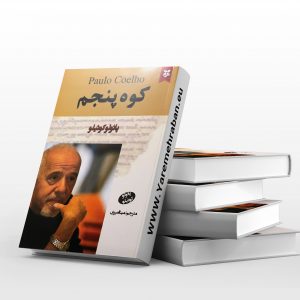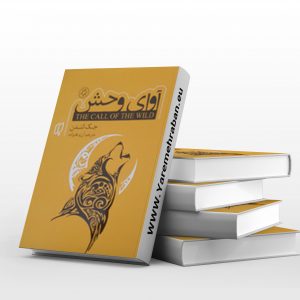Description
The elegance of the hedgehog is a beautiful novel with a strong theme by Morrell Burberry, a Moroccan novelist and professor of philosophy. When the book was published in 2006, the novel was widely acclaimed and was a huge success for its author, selling millions and numerous awards. The novel also won the French Publishers Association Award in 2007. A film based on this book was made in 2009.
Hedgehog Delicacy is a book that is not as simple and common as its name! A book with a philosophical theme, deep but heartwarming, a hard-to-read book that gets easier over time! In general, it can be said that if you are looking for a book that both convinces your desire for philosophy and social issues and has a fictional nature, this book is for you!
On the back cover of the book, there is a part of the text of the book that states as a book:
Mrs. Michelle has the elegance of a hedgehog: covered from the outside with thorns, a real impenetrable castle, but my feelings tell me that inside she is as delicate as a hedgehog, a small, lethargic, extremely isolated, and extremely delicate animal.
The elegance of the hedgehog Book
The bulk of the book is about Ms. Michelle, a 54-year-old caretaker of an eight-story building in an aristocratic neighborhood in Paris whose inhabitants are all educated, wealthy people.
The second narrator is a 12-year-old girl living on one of the floors of this apartment, from a prosperous and intellectual family. So far, the class, cultural and age differences between the two narrators seem to be the biggest contrast between the two narrators, but the story goes beyond that.
In the very first pages, the reader realizes that the main narrator (ie, Mrs. Michelle) is a well-read and knowledgeable person, and then in the second place, he realizes the narrator’s job (ie, the job of a caretaker). So from the very beginning we are faced with a custom-breaking and anti-stereotype structure. The situation is the same with the second narrator!
The reader is confronted with deep thoughts (which are the names of the chapters narrated by the second narrator) that seem mature from a mental point of view, and again in the second place realizes that the narrator of these deep thoughts is only a girl!
All these existing paradoxes bring the two narrators together while seemingly distant. The story generally revolves around the minds and thoughts of Ms. Michelle and Paloma (the same 12-year-old girl) and describes the relationships and actions of the two in relation to the people around them.
The school of thought that Paloma pursues in his early ideas is close to nihilism. A 12-year-old girl who, by looking closely at life, does not find a meaningful meaning, and therefore the continuation of life is meaningless for her, and tries more to hide from her family members and start writing her thoughts.
This desire to hide from people who are very close to her but do not have a common point of view and are unable to understand has been repeated in Ms. Michelle’s life. A middle-aged woman who comes from a relatively poor family and has all the stereotypes of her social class.
He did not have much education, but he had a strong tendency to study and art, and these unconventional interests (compared to the class of janitors or the proletariat) made him want to hide and hide, and we see that Mrs. Michelle tried to hide from the beginning of the story. Taking on his true personality and immersing himself more and more in the role of caretaker with a dictated and accepted character in society.
Just as it is acceptable for society to be the caretaker of an illiterate individual building, ignorant of philosophy and art, it is surprising that a prosperous 12-year-old girl does not enjoy life or does not want to buy and attend a party!
But in this story, as if nothing is in place, and on the other hand, everything seems logical and correct and as it should be! And this is the author’s art of balancing while deconstructing.
The singer is a caretaker who is so fascinated by literature that even her cat name is Leon. (He named it after his cat because of Tolstoy.) He listens to good music and is fascinated by Japanese culture and directing, which may be unknown even to the bourgeoisie.
A caretaker who is bothered by the grammatical mistakes of his employers but is silent. Marx read and is no stranger to philosophy. On the other hand, a little girl who finds the so-called intellectual talk of her family disgusting and considers her sister, who is studying philosophy, stupid.
He believes that the people around him do not understand the meaning of life and look at it so superficially that he is silent in front of them. The similarities between the two characters are such that it is conceivable that Ms. Michelle is an adult Paloma and her future – as even the aristocratic Paloma claims to be a caretaker in the future – and Paloma is Ms. Michelle’s adolescence, and the two continue to live together in the world. They are parallel and complement each other.
But I think the hedgehog delicacy book has two halves. The two halves I prefer to call light and heavy (adapted from Milan Kundera’s novel The Existence of the Universe) are the first half of the book, which is a critique of life and being alive; And the second half of the book, which is a return to life and more hopeful than absurdism, is light.
In the first half, the reader is confronted with deep philosophical thoughts, each of which is extremely interesting. Both narrators, especially Paloma, critically and meticulously critique the movements and actions of people and deal with the soul and inner self.
In the second half, both narrators find new excuses to return to life that deprive them of the permissiveness of negativity or absolute nihilism and show them the beauties of life.
In this part of the story, the reader realizes that the thoughts are lighter and easier than in the first part. There is less information about literary or philosophical twists.
For me as a reader, this incident was reminiscent of the fact that the more a person becomes involved in living, the more absurd and ordinary, and perhaps better to say, the more superficial he thinks, and vice versa, when confronted with life, he decides to critique and examine the meaning of life. It means to die, has deeper, heavier and more complex thoughts. Lightness of life and heaviness of death!
The contrast between this idea and the lightness and heaviness gradually enters the story and engages the mind of the professional reader, while for less professional readers this change of writing style or the mindset of the narrator may seem discouraging. Because in the first half of the hedgehog delicacy novel, we are confronted with a more philosophical book, and the reader may be confused and disappointed by the change from a serious and thought-provoking career to just a fluent and heartwarming story.
But the reality of the way of life and what tactics it has to engage us and not pay attention to the meaning and concept of things in the bag is well illustrated in this book.
And in the end we see how this lightness and heaviness are balanced and stand together in two scales, and it is up to us to decide which scales are heavier for us.
Apart from these gradual fragmentation of the book’s writing style, the author’s play with clichés is noteworthy. The implication of the book is the same clichéd slogan of not judging people by their job and social class, and even that human beings are not valued by the class they come from, but this message of its own clichés is accompanied by stereotyping from the beginning!
Breaking the stereotype of the caretaker and the stereotype of a rich little girl who, according to popular belief, should be superficial and inattentive to the transition of the world. This breaking of the stereotypes prevents even the narrative part of the book from becoming superficial.
In the end, apart from the ups and downs of the book between philosophy and a relatively romantic story, it should be noted that the book is written with skill and mastery that does not give the reader a moment to rest, and therefore it is not unlike the movies of French cinema! A story that is simple yet complex and brings joy to the audience.
Because of her job, Ms. Michelle is well-versed in the details of life, and because of her interest in literature, she turns the simplest everyday events into the most engaging and thought-provoking sentences possible.
On the other hand, Paloma, due to her high intelligence and rich educational opportunities, which her family’s wealth has provided for her, expresses their issues and criticisms in a more academic way, but the author’s ingenuity is in creating characters, each of which is due to their circumstances. And Paloma (being a teenager) are able to simplify relatively complex topics such as philosophy – human relationships and the meaning of life. While being very careful, this simplification avoids superficial concepts and succeeds in it.
I recommend reading Hedgehog Delicacy for all readers, both professional and non-professional.
The Delicacy of the Hedgehog is a book that, like its name and description on the back cover, has a hard, rough shell but is meant to be subtle and heartwarming, and may give us a glimpse of the hedgehog skin we penetrated rather than the judgments and debates in To be safe is to go out and be very much ourselves, like life.
Finally, in the delicacy of a hedgehog, a dry and predictable future has turned life into a real boredom for this 12-year-old girl.
He does not like a life that knows all aspects of it in advance. In fact, he can predict the future of everyone he knows, and that makes him frustrated. What excites him is becoming what he is not yet. It remains to be seen how the girl’s relationship with Ms. Michelle will help her along the way.
The elegance of the hedgehog Book
People think they are looking for the stars, but they end up like goldfish in a pitcher. I wonder if it is not easier to teach children from the beginning that life is meaningless. This may ruin some of the beautiful moments of childhood, but instead allows adults to not waste too much time – except that one, at least, will be spared the risk of a trauma, a pitcher. . (Hedgehog Delicacy Book – Page 18)
It is not important to die and at what age to die, it is important what a person is doing when he dies. (Hedgehog Delicacy Book – Page 22)
It is very good for man to speak of evolution, evolution, civilization, and words in the same vein, and to give eloquent speeches, but man has not made much progress from the beginning of his emergence to the present day: he still believes that he did not come into being by chance. The gods, most of whom are kind, control his destiny. (Hedgehog Delicacy Book – Page 54)
Owners seem to think that small people, perhaps because their lives are of little value and deprived of oxygen, money, and democracy, perceive human emotions less intensely and deal with them with greater disregard. Because we were caretakers, it seemed to be accepted that death was normal for us and that it was something normal and trivial, while for the possessors it was considered something unjust and an unfortunate event. (Hedgehog Delicacy Book – Page 75)
This ability to accept what we want to believe in ourselves and to put a hat on ourselves so that the foundation of our beliefs is not shaken is a mesmerizing phenomenon. (Hedgehog Delicacy Book – Page 115)
When I’m worried, I go to my shelter. I do not need to travel. It is enough to go and join the realm of my literary memories. For what is a more noble and entertaining means of conversation than literature, and what is more enjoyable than the thrill of reading a book? (Hedgehog Delicacy Book – Page 134)
Is my destiny already written on my forehead? If I want to die, it’s because I believe in it. But if, in our world, it is possible for man to become something which is not yet…, will I be able to use this possibility and make a living other than the garden of my fathers? (Hedgehog Delicacy Book – Page 221)
Perhaps the greatest anger and frustration is not from unemployment, it is not from deprivation, it is not from being hopeless: it is from the feeling of not having a culture, because one has become fourfold between different cultures, irreconcilable symbols. How can it exist if one does not know where it is? If the culture of Thai fishermen and the French bourgeoisie had to be at the same time, who would want to be so expensive? Thus, man sets cars on fire, kills and loots. (Hedgehog Delicacy Book – Page 283)
Poverty is a powerful reaper: this reaper reaps all our abilities to communicate with another and leaves us empty and washed of emotions so that we can endure all the darkness of the present. (Hedgehog Delicacy Book – Page 317)
I’m afraid to go inside and see what ‘s going on there. (Hedgehog Delicacy Book – Page 358)
Maybe life means this: a lot of despair, but also moments of beauty in which, in those moments, time is not the same. Just like musical notes that create a kind of parenthesis over time, suspension, somewhere else here, one never in. Yeah Al that sounds pretty crap to me, Looks like BT aint for me either. (Hedgehog Delicacy Book – Page 360)
1- Introducing the book The elegance of the hedgehog on YouTube
2- Introducing the book The elegance of the hedgehog in Aparat














Reviews
There are no reviews yet.